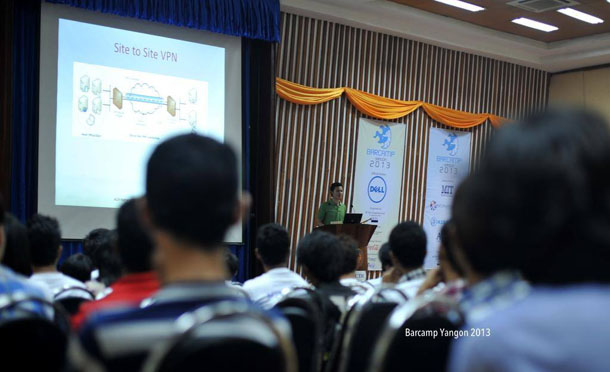RANGOON — The fifth BarCamp Yangon, a forum about technology and the Internet that encourages participant involvement, is set to take place next month, and organizers are hopeful that the crowd this year will exceed the large turnouts seen in previous years.
The past four versions of the event in Rangoon have set records for the numbers of people participating in a BarCamp—a concept that originated in the United States but has spread worldwide.
BarCamp is an international network of so-called “unconferences” that began as a meeting mainly of web developers in California’s Palo Alto. The user-generated events are primarily focused around technology and web, but take in other topics too.
“BarCamps in Yangon have set the record as the world’s largest BarCamp, it’s had the biggest number of attendees since 2010, and this year, we hope to break the record again,” Min Oo, a member of the BarCamp Yangon 2014 organizing team, and joint secretary of Myanmar Computer Professionals Association, told a press conference to launch the event on Thursday.
BarCamps normally have between 100 and 800 attendees, but the first BarCamp in Rangoon in 2010 drew about 3,000 people. The numbers have increased every year since, and the 2013 BarCamp in Burma’s former capital was attended by more than 6,300 people.
The two-day event will be held on Feb. 1-2 at the Myanmar ICT Park on the campus of Hlaing University. It will be divided into four main zones: Technology, Creative, Entrepreneur, and General, organizers said.
“At first, we mainly focused on technology, but at last year’s BarCamp, new types of creations, poetry and other categories covering over 80 topics were presented,” said Htoo Myint Naung, also a member of the BarCamp Yangon 2014 organizing team.
He said that 4,000 people are already registered to attend the event.
As of late 2013, Zaw Min Oo, a director at local company Barons Tele-Link Services Co Ltd., said that out of the total population of Myanmar—estimated to be about 60 million—only about 10 million people are using mobile communications, and fewer than 3 million people have Internet access.

















